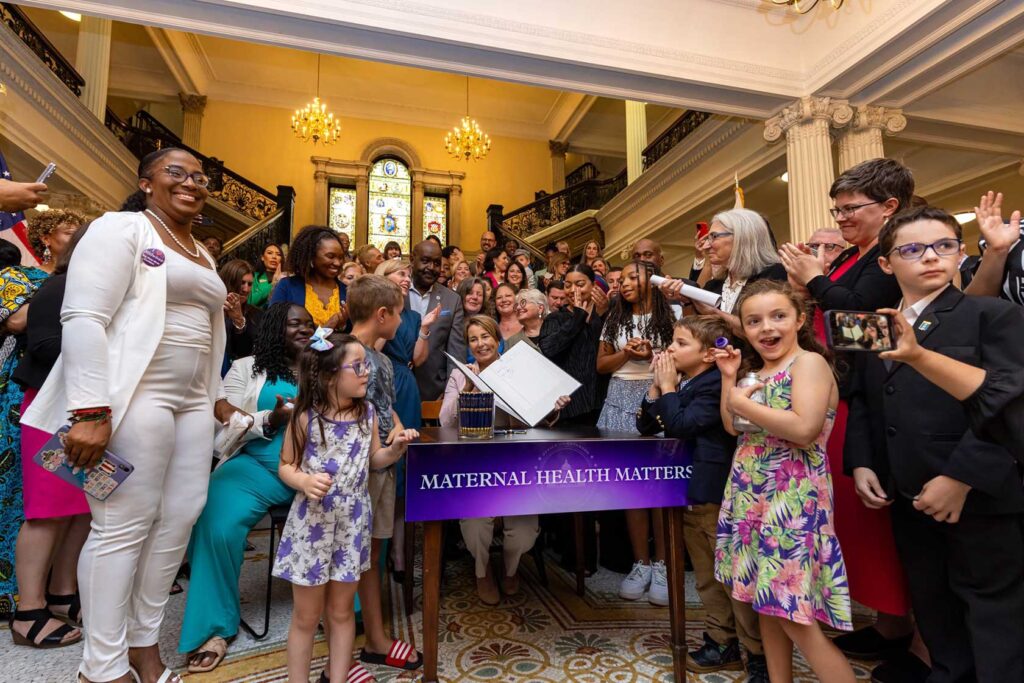For pending Roxbury birth center, new maternal health legislation offers expanded potential

Five minutes down the road from Nubian Square, a little parcel of land is in the works to become a place for community members to have a different experience when giving birth.
The pending Neighborhood Birth Center, planned to be built at 14 Winthrop St., will bring access to birth-focused health care outside of a hospital.
Tiffany Vassell, manager of community engagement and communications at Neighborhood Birth Center, has big hopes for the space, which will be a “spa-like” center, according to its website, that includes green space and hosts education and support alongside birthing suites.
“We want folks to feel like they belong,” Vassell said.
The potential for the Neighborhood Birth Center and the array of services it plans to offer — Vassell said they hope to provide access to not only midwives and clinicians, but also mental health professionals and lactation consultants — is bolstered by expanded state support for out-of-hospital birth options.
The Massachusetts Department of Public Health on Oct. 4 announced a $1 million grant going to Neighborhood Birth Center and two other midwifery organizations in the state. And new legislation passed this summer creates a pathway to licensure for certified professional midwives, or CPMs — health care providers who provide care before, during and after pregnancy — and requires MassHealth to cover reimbursement for their services. Those changes, Vassell said, will be important for extending this sort of care to more people at the Roxbury birth center and in other settings across the state.
“We want to make CPMs and the care that they provide, whether at home or birth centers, as accessible as possible for folks who really want that type of care,” Vassell said.

Four birth suites will open to a large porch with seating and access to a private “labor garden.” IMAGE: ARTIST RENDERING OF THE FUTURE NEIGHBORHOOD BIRTH CENTER
Emily Anesta, president of the Bay State Birth Coalition, said she’s seen a desire for expanded access to the kinds of at-home and birth-center care the bill provides.
“This is something that a lot of families and birthing people have said that they want and have been asking for,” she said.
The bill takes a stab at a number of efforts around maternal health, with no small focus going toward expanding access to out-of-hospital birth options.
Under the legislation, Massachusetts becomes the 39th state to create a way for certified professional midwives to become licensed. It creates a Board of Registration in Midwifery within the state’s Department of Public Health and requires MassHealth to cover the services of midwives, as well as screenings for postpartum depression and access to doulas — nonmedical professionals who provide support for the person giving birth and their family throughout the pregnancy.

One of 4 luxurious birth suites with privacy, a spacious bathroom, access to the garden and a large birthing tub. IMAGE: ARTIST RENDERING OF THE FUTURE NEIGHBORHOOD BIRTH CENTER
It also establishes a task force to monitor and report on maternal health access and birthing patient safety.
Better access to maternal care might help reduce negative health impacts or death from pregnancy and birth. Supporters of the legislation say that the increased access will be especially impactful in communities of color.
A 2023 report on maternal and infant health from the Boston Public Health Commission found that Black infants in Boston were more likely to be born at lower birthweights and were more likely to be born preterm. In 2021, Boston’s infant mortality rate for Black infants was over three times the mortality rate for white infants.
Research has shown that care from midwives can lead to fewer cases of infant mortality and severe injury, reduced need for cesarean sections and fewer premature births
For birth center patients with complications, hospitals and their doctors will serve as a second line of support. Vassell said Neighborhood Birth Center plans to have a transfer agreement with nearby Boston Medical Center.
Anesta noted that a big part of the improvement in care will simply come from a midwifery care process that tends to be longer, giving patients more time to have their desires and needs be heard.
“There’s nothing inherent about the color of people’s skin that needs to result in worse pregnancy and birth outcomes,” Anesta said. “To really address the racism and the structural barriers to receiving the best quality care and for people to really be listened to, there’s a lot of components in the bill that really get at that.”
It’s one of the reasons Vassell is excited about the Neighborhood Birth Center opening in a predominantly Black neighborhood.
“We’re so excited about it; the community is excited about it,” she said. “Roxbury is just such a powerful place for Black and brown folks, and it just feels so right to center Roxbury as we open this first of its kind in Boston.”
She said the legislation will allow new options at the center, which is expected to break ground next year and open its doors in 2026.
“This bill allows us to be able to consider CPMs as clinical directors,” she said. “This bill helps to create a workforce for Neighborhood Birth Center. We’re looking to start hiring folks as our building is being built and our doors are going to open.”
Beyond Boston
The legislation’s expanded support offers potential for birth centers across the state, Anesta said.
“We have a real opportunity in Massachusetts to start seeing these options more widely available and available in communities that have really lacked access to birth options, whether that’s because they’re rural communities, where we’ve seen community hospitals close, or even urban communities where people want to have access to different birth options and they just have not been available,” she said.
Currently, there is just one operational birth center in Massachusetts — Seven Sisters Midwifery & Community Birth Center in Northampton. Two others — Cambridge Birth Center, which was operated by Cambridge Health Alliance near Harvard Square, and North Shore Birth Center on the campus of Beverly Hospital — closed within the past few years.
The new support around licensure and insurance, Anesta said, will make it more possible for birth centers to open across the state.
Worcester Community Midwifery, which, alongside Neighborhood Birth Center and Seven Sisters, split the $1 million in grant funding provided by the state earlier this month, is working to open a birth center in central Massachusetts.
Vassell said a shift toward more birth center access can help balance out the hospital-focused care that currently exists.
“We know Massachusetts is very hospital-heavy. We know we have the best hospitals in the world — but birth is more than just an intervention or an induction,” Vassell said. “It’s so much more than that, and we know that when folks receive care from midwives, there are better outcomes for themselves and their baby.”






